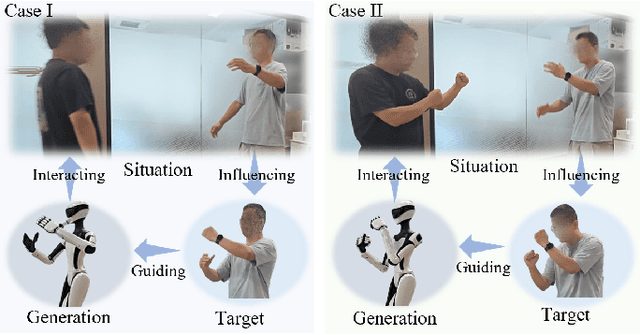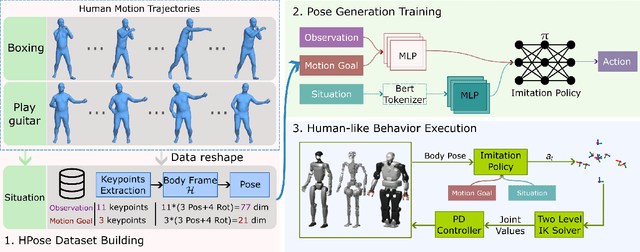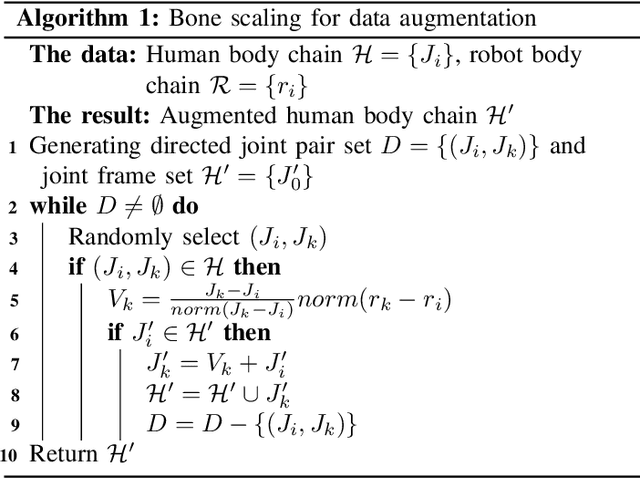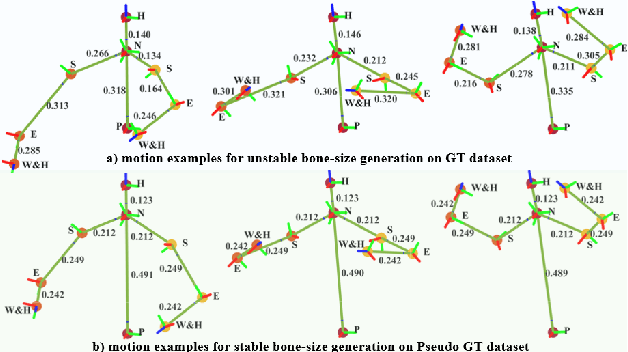Shipeng Lyu
HuBE: Cross-Embodiment Human-like Behavior Execution for Humanoid Robots
Aug 26, 2025



Abstract:Achieving both behavioral similarity and appropriateness in human-like motion generation for humanoid robot remains an open challenge, further compounded by the lack of cross-embodiment adaptability. To address this problem, we propose HuBE, a bi-level closed-loop framework that integrates robot state, goal poses, and contextual situations to generate human-like behaviors, ensuring both behavioral similarity and appropriateness, and eliminating structural mismatches between motion generation and execution. To support this framework, we construct HPose, a context-enriched dataset featuring fine-grained situational annotations. Furthermore, we introduce a bone scaling-based data augmentation strategy that ensures millimeter-level compatibility across heterogeneous humanoid robots. Comprehensive evaluations on multiple commercial platforms demonstrate that HuBE significantly improves motion similarity, behavioral appropriateness, and computational efficiency over state-of-the-art baselines, establishing a solid foundation for transferable and human-like behavior execution across diverse humanoid robots.
Instruction-Augmented Long-Horizon Planning: Embedding Grounding Mechanisms in Embodied Mobile Manipulation
Mar 11, 2025Abstract:Enabling humanoid robots to perform long-horizon mobile manipulation planning in real-world environments based on embodied perception and comprehension abilities has been a longstanding challenge. With the recent rise of large language models (LLMs), there has been a notable increase in the development of LLM-based planners. These approaches either utilize human-provided textual representations of the real world or heavily depend on prompt engineering to extract such representations, lacking the capability to quantitatively understand the environment, such as determining the feasibility of manipulating objects. To address these limitations, we present the Instruction-Augmented Long-Horizon Planning (IALP) system, a novel framework that employs LLMs to generate feasible and optimal actions based on real-time sensor feedback, including grounded knowledge of the environment, in a closed-loop interaction. Distinct from prior works, our approach augments user instructions into PDDL problems by leveraging both the abstract reasoning capabilities of LLMs and grounding mechanisms. By conducting various real-world long-horizon tasks, each consisting of seven distinct manipulatory skills, our results demonstrate that the IALP system can efficiently solve these tasks with an average success rate exceeding 80%. Our proposed method can operate as a high-level planner, equipping robots with substantial autonomy in unstructured environments through the utilization of multi-modal sensor inputs.
* 17 pages, 11 figures
 Add to Chrome
Add to Chrome Add to Firefox
Add to Firefox Add to Edge
Add to Edge